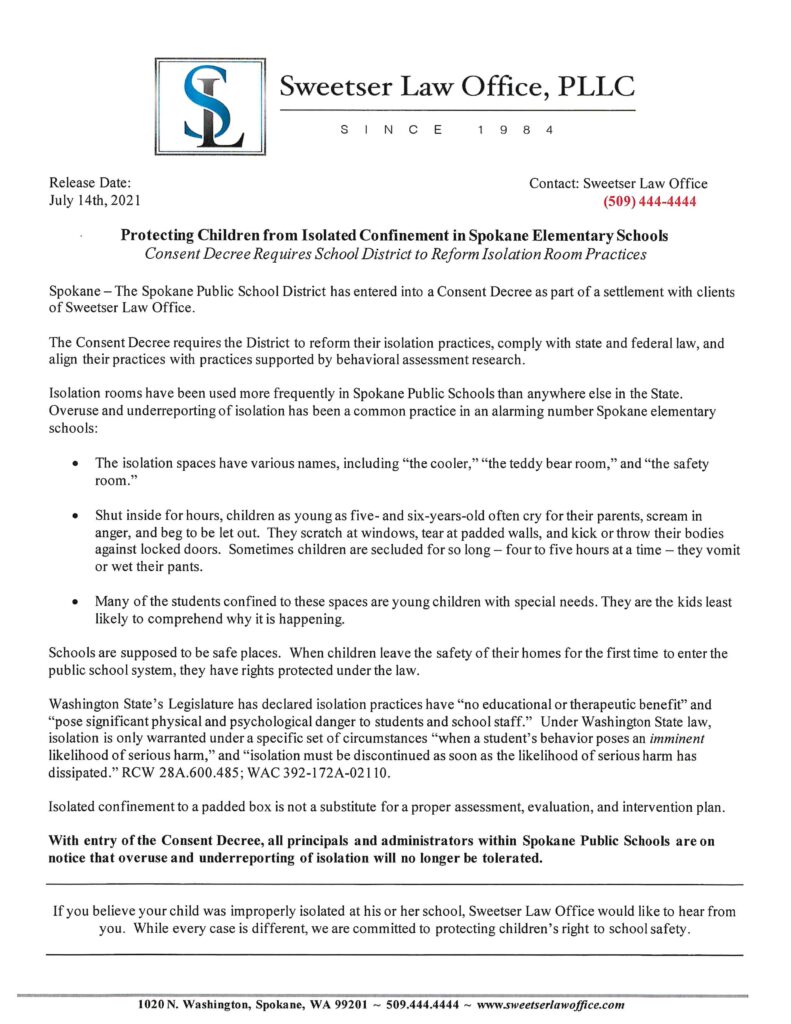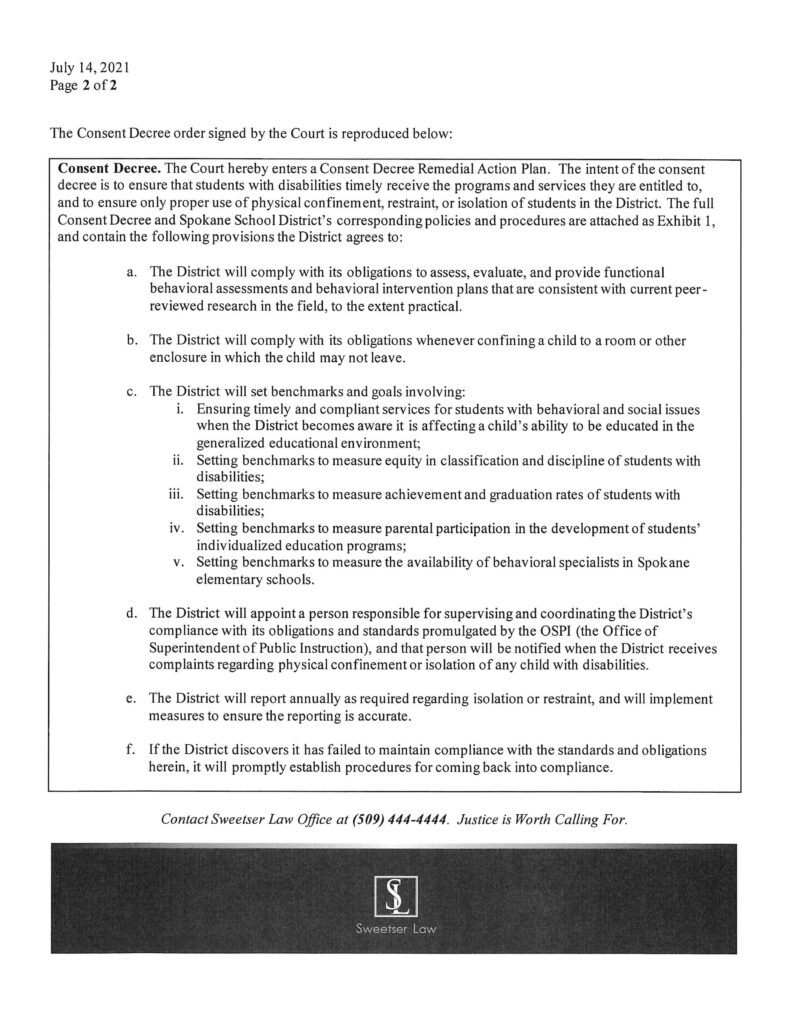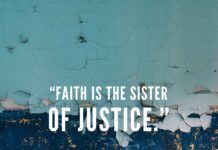A big part of my decision to become a trial lawyer was to be part of something bigger than myself. I believe that trial lawyers have an obligation to make their communities a better place – both through litigation and community service.
There is perhaps no circumstances I find this commitment more important than when it comes to the health, safety, and happiness of kids.
Children have certain inalienable rights and they enjoy special protection under our laws because they are more vulnerable. Kids can be afraid to speak out. They may not be able to communicate effectively. Sometimes, they need an advocate. Matthew 25:40, reads, “And the King will answer and say to them, ‘Assuredly, I say to you, inasmuch as you did it to one of the least of these My brethren, you did it to Me.”
Our firm was involved in a number cases in which Spokane elementary schools had isolated and secluded young elementary students with special needs. When we spoke with the first family I thought what had happened to their child was an unfortunate individual incident. But when more families called with similar stories, we knew we had to investigate further. What we discovered is that Spokane elementary schools have a troubling pattern. Overuse and underreporting of isolation is a common practice in an alarming number Spokane elementary schools. Isolation rooms were being used more frequently in Spokane elementary schools than anywhere else in the State of Washington.
Washington State’s Legislature has declared isolation practices have “no educational or therapeutic benefit” and “pose significant physical and psychological danger to students and school staff.” Under Washington State law, isolation is only warranted under a specific set of circumstances “when a student’s behavior poses an imminent likelihood of serious harm,” and “isolation must be discontinued as soon as the likelihood of serious harm has dissipated.” RCW 28A.600.485; WAC 392-172A-02110.
Yet shut inside a room for hours, children as young as five- and six-years-old often cry for their parents, scream in anger, and beg to be let out. Alone and terrified, they will scratch at windows, tear at padded walls, and kick or throw their bodies against the locked doors. Sometimes children are secluded for so long – four to five hours at a time – they vomit or wet their pants.

Many of the students confined to these spaces are kindergarten or first grade ages with disabilities or developmental delays. They are the kids least likely to comprehend why it is happening.
A first-grade student in Tumwater, Washington, who experienced similar isolation explained: “It made me feel kind of worried that they would lock me in there and leave me in there,” said Braedon, who had advanced to second grade. “It made me feel like they don’t want me.” (K5 News: Thousands of Washington students isolated and restrained, despite law limiting practice.) “He would be afraid to go to school. He would just say, ‘They hurt me. They don’t like me. They are mean to me and I don’t want to go,’” Braedon’s mother said. “Once he had been removed from school, within a few weeks the self-injuries disappeared. The escalation in behaviors that we had started to see at home were gone,” she said. “We had the kid back we knew.”
Our firm took on the cases, for every family. We fought hard to protect Spokane children from being unlawfully confined by elementary school principals or administrators. Systemic misconduct throughout the district was not some isolated incident. In fact, it is likely not due to any teachers at all. Where do teachers send a child when they need help? The principal’s office. What we learned is that illegal isolation practices were being used district-wide by the administrators; the very people paid by our tax dollars to oversee the schools – the people that are supposed to do right by our kids.
Years of research show the practice of ritually isolating and restraining students is not only outdated and controversial, but it doesn’t work. The U.S. Department of Education warned states in 2009 – and again in 2012 – that “restraint and isolation should be avoided to the greatest extent possible,” and used only as a last resort in safety emergencies. That is why Washington State’s Legislature has declared isolation practices have “no educational or therapeutic benefit” and “pose significant physical and psychological danger to students and school staff.” Medical experts have also testified that unwarranted isolation has a lasting physical and psychological impact on young children. All that ritually isolating students accomplishes is it gets a student who has behavioral challenges out of the way. But it doesn’t teach a child anything about self-control or about effective ways of dealing with sensory differences or what his or her triggers are for the behavior that is causing a problem. Isolated confinement of kindergarteners and first-graders sends a terribly destructive message to a child and a very unfair one because it is a young child with disabilities who needs help and support.
Isolated confinement to a padded box is not a substitute for a proper assessment, evaluation, and intervention plan. We cannot allow these systemic practices to continue to traumatize children. So, I am proud that we fought hard for Spokane children who were unlawfully isolated by their elementary school principals or administrators.
I’m proud of the result as well. There was certainly monetary accountability paid to compensate for what occurred to the children. But also as part of the settlement agreement, Spokane Public School District entered a public Consent Decree in court. A consent decree is a court-ordered agreement that is used to address violations of the law or systemic misconduct. They safeguard civil rights – in this case the rights of our kids while attending Spokane elementary schools. The Consent Decree requires the District to reform their isolation practices, comply with state and federal law, and align their practices with practices supported by behavioral assessment research.
Our firm is proud to fight through litigation for the health and happiness of children. Today, promised changes are underway in Spokane Public Schools. The Consent Decree signed by the Court is reproduced below in the press release:


















